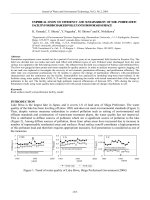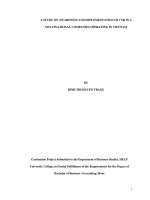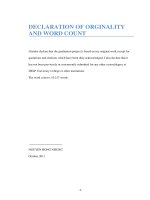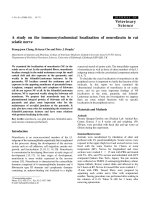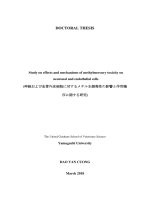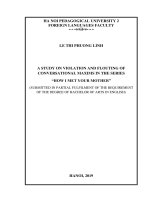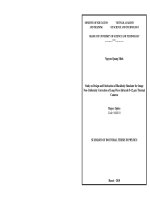a study on awareness and implementation of csr in a multinational companies operating in vietnam
Bạn đang xem bản rút gọn của tài liệu. Xem và tải ngay bản đầy đủ của tài liệu tại đây (504.75 KB, 91 trang )
i
A STUDY ON AWARENESS AND IMPLEMENTATION OF CSR IN A
MULTINATIONAL COMPANIES OPERATING IN VIETNAM
BY
DINH THI HUYEN TRANG
Graduation Project Submitted to the Department of Business Studies, HELP
University College, in Partial Fulfillment of the Requirements for the Degree of
Bachelor of Business (Accounting) Hons
ii
April 2011
Declaration of Originality and Word Count
DECLARATION
I declare that this graduation project is based on my original work except for quotations
and citation which have been duly acknowledged. I also declare that it has not been
previously or concurrently submitted for any other courses/degrees at HELP University
College or other institutions.
Word Count: 16,970 words.
DINH THI HUYEN TRANG
Date 28/03/2011
iii
Acknowledgements
As a student, our main responsibility is to absorb and learn as much as we can
from the assistance, support and encouragement of many people such as our mentors and
teachers around us. They help us to learn, to apply our knowledge and to grow. In
addition, this project would not have been made without them. I want to thank to thank
all the people who have guided me in the right direction and kept me motivated during
the time of completing the dissertation.
First, I would like to express my deep gratitude to my supervisor, Dr Le Van Lien
from International School at Vietnam National University, Hanoi who guide me
in my choice of assignment. His guidance throughout and inspiration for me to
create new ideas has helped me to learn and grow personally.
I also would like to express my thank to Ms. Sumathi and Ms. Shenba at Help
University College, who initiated the project and give so much instruction and
support.
iv
Abstract
A STUDY ON AWARENESS AND IMPLEMENTATION OF CSR IN
A MULTINATIONAL COMPANY OPERATING IN VIETNAM
BY
DINH THI HUYEN TRANG
April 2011
Supervisor: Dr. Le Van Lien
As we know that CSR (Corporate Social Responsibility) is no longer a familiar term for
the developing countries in the world. CSR has had a long history and developed more
and more all over the world. Nowadays, many business entities want to implement CSR
in their business operation. Although CSR has became a new trend in the world but it is a
new term with Vietnamese and many business entities. The knowledge of CRS in
Vietnam is limited because there are not many researchers on the CSR field. Many recent
years, taking part in many organizations and political economy in the world WTO,
ASEAN has attracted many investors and business organizations to operate in Vietnam
that CSR is familiar with them. Their awareness can be consider is full but some
multinational companies operating in Vietnam took advantages of unknown of
Vietnamese to not implement CSR such as polluting environment. The economy is so
open that there are many critical case and scandals concerning about CSR such as case of
Vedan Company, Thanh Cong Company, Sabeco Song Lam Company and Tung Khuang
Company. It can be consider as the result of the economic boom. This means that CSR
has become a hot title for the researchers to conduct the survey about CSR.
v
The objective of the research is to access the understanding the completed concept of
corporate social responsibilities and other relevant components under this area. Besides,
the objective understands awareness and implementation, CSR reporting of CSR in a
multinational company operating in Vietnam by asking respondents' understanding and
opinion.
From conducting the research, it is able to show the understanding and awareness about
CSR concept of multinational companies operating in Vietnam is unlimited but their
implementation is limited. These multinational companies have to find hard to use CSR
as a tool to value firm, implement CSR in Vietnam as much as they can, and especially
have to follow Vietnam regulation and law to protect the environment and community to
be better.
vi
TABLE OF CONTENT
Declaration of Originality and Word Count ii
Acknowledgements iii
Abstract iv
TABLE OF CONTENT vi
List of Figures and Tables x
List of Abbreviations xi
CHAPTER I: INTRODUCTION 1
1.1 CSR in the world 2
1.2 CSR in Vietnam 3
1.2.1 Government actions 3
1.2.2 CSR practices and challenges 4
1.3 CSR in multinational companies operating in Vietnam 4
1.4 Reasons for further investigation 5
1.5 Problem statement 5
1.6 Objectives and Sphere of research 7
1.6.1 Objectives of research 7
1.6.2 Sphere of research 7
1.7 Research Methods 8
1.8 Structure of research 8
CHAPTER II: LITERATURE REVIEW 9
2.1 CSR definition 10
2.2 Research related concepts 10
vii
2.2.1 CSR and Business ethics 10
2.2.2 CSR and Socially responsible investing 11
2.2.3 CSR and Sustainability investing 11
2.2.4 CSR reporting 12
2.3 Researches and Studies 12
2.3.1 Carroll's 1979-1991 conceptualization 13
2.3.2 Wood 1991 conceptualization 16
2.4 Hypothesis 18
2.4.1 Management's attitude toward CSR 18
2.4.2 Consumers' attitude toward CSR 19
2.4.2 Workers' attitude to CSR 19
CHAPTER III: RESEARCH METHODOLOGY 22
3.1 Research objectives 23
3.2 Research methodology 23
3.3 Data source 23
3.3.1 Primary data 23
3.3.2 Secondary data 24
3.4 Research method 24
3.5 Research tool 25
3.5.1 Questionnaire 25
3.5.2. Annual report 25
3.6 Data collection 26
3.7 Sampling 26
viii
3.7.1 Sample population 26
3.7.2 Sample frame 26
3.7.3 Sample size 27
3.7.4 Sample techniques 27
3.8 Limitations 27
CHAPTER IV: FINDING AND ANALYSIS 29
4.1 Responds summary 30
4.2 Management 31
4.2.1 Finding from questionnaire survey and interview 31
4.2.1.1 Management's attitude toward CSR 31
4.2.1.2 Implementation of CSR 34
4.2.2 Actual disclosure by Dutch Lady 40
4.2.3 Overall evaluation of management's responses 41
4.3 Consumers 41
4.3.1 Finding from questionnaire survey 41
4.3.1.1 Consumers' attitude toward CSR 41
4.3.1.2 Consumers' stated support for social responsible businesses 44
4.3.2 Overall evaluation of consumer's responses 47
4.4 Employees 50
4.4.1 Finding from questionnaire survey 50
4.4.1.1 Employees' attitude toward CSR 50
4.4.1.2 Employees' stated support for social responsible businesses 52
4.4.2 Overall evaluation of employees' responses 54
ix
4.5 Discussion 55
CHAPTER V: CONCLUSION AND RECOMMENDATION 58
5.1 Conclusion 59
5.2 Recommendation 61
5.3 Limitation of study 62
5. 4 Suggestion for the future research 62
REFERENCES 64
APPENDICES 72
Appendix A: Questionnaire sample 72
x
List of Figures and Tables
Figure 2.3a: A hierarchy of CSR (adapted from Carroll, 1991) 15
Figure 2.3b: The Wood's CPS Model (adapted from Wood, 1991) 17
Table 1: The important factors for employees (Ewin.com survey)………………….21
Table 2: Respondents 30
Table 3: Consumer category 31
Table 4: Employee of category 31
Table 5: Distribution responses of management's attitude toward CSR……………32
Figure 4.2: Distribution of response of management's attitude toward of CSR 34
Table 6: Question 1 - Result and analysis consumer's attitude toward CSR 42
Table 7: Question 2 - Result and analysis consumer's attitude toward CSR 42
Table 8: Question 3 - Result and analysis consumer's attitude toward CSR 43
Table 9: Question 4 - Result and analysis consumer's attitude toward CSR 44
Table 10: Question 5 - Result consumers' stated support for social responsibility 45
Table 11: Question 6 - Result consumers' stated support for social responsibility 45
Table 12: Question 7 - Result consumers' stated support for social responsibility 46
Table 13: Question 8 - Result consumers' stated support for social responsibility 46
Figure 4.3a: Distribution of response of consumers' attitude toward of CSR 48
Figure 4.3b: Distribution of response of consumers' stated support for social
responsibility 48
Table 14: Distribution of responses from employees' survey………………… … 50
Figure 4.4: Distribution of response from employees survey 52
xi
List of Abbreviations
CSR Corporate Social Responsibility
WTO World Trade Organizations
ASEAN Association of Southeast Asian Nations
IMF International Monetary Fund
APEC Asia - Pacific Economic Cooperation
ASEM Asia - Europe Meeting
VCCI Chamber of Commerce and Industry of Vietnam
OSHA Occupational Safety and Health Administration
WBCSD World Business Council for Sustainable Development
SRI Socially responsible investing
PR Public relation
xii
1
CHAPTER I: INTRODUCTION
1.1 CSR in the world
1.2 CSR in Vietnam
1.2.1 Government actions
1.2.2 CSR practices and challenges
1.3 CSR in multinational companies operating in Vietnam
1.4 Problem statement
1.5 Objectives and Sphere of Research
1.5.1 Objectives of research
1.5.2 Sphere of research
1.6 Research Methods
1.7 Structure of Research
2
1.1 CSR in the world
Corporate Social Responsibility (CSR) is longer a familiar in the world but it is still a hot
term to not only enterprises, investors but also customers, entire society. Everyday, there
are many activities related to CSR. Enterprises use CSR as a tool to develop their
reputation in the global market. Investors use CSR as a main factor to consider in the
decision of enterprises to invest responsibility. Customers and entire society consider
CSR as an important factor to determine the cost, quality and progress of an enterprise.
Because of the important of CSR, many corporations can pay a lot of money for CSR to
become a perfect business model, responsible for society, and to have beliefs of
community. Implementing CSR includes having quality assurance of staffs' living
standard, protecting environment, making useful products for customers and
environment, raising fund for charity and donation for society and community. In making
useful products for customers and community, there are many evidences of companies
which have done well such as Best Buy co., Inc ( applying recycled goods program), or
Abbott ( distributing their products in environmentally friendly packing materials). In the
area of making quality assurance of staff's living standard, a web search “Google" which
treats their staff as golden is a best example. More than that is many corporations raise
funds for charity and donation such as Microsoft, World Bank. Especially, the
billionaires use their fortune to contribute in social activities as Bill Gates, Warren
Buffett.
3
1.2 CSR in Vietnam
The globalization is a trend, which has created many development
opportunities for all countries in the world. Vietnam is in the process of
industrialization and modernization in order to create facilities for a period of
transition to socialist household in many areas such as economy, education,
culture…The evidences is taking part in many organizations and political economy in
the world such as World Bank, IMF, APEC, ASEM, ASEAN. This encourages
Vietnamese economic development rapidly in the harmony way with the global trend.
However, CSR is still a relative new concept. The awareness and implementation
about CSR is limited. According to Nguyen Hong Ha, deputy director of the Chamber
of Commerce and Industry of Vietnam (VCCI) in Ho Chi Minh City “CSR must be
placed on the business strategies of each business. It was, is and will be an essential
part to the success of the enterprise".
1.2.1 Government actions
Vietnam is a potential to many investors all over the world. With open-door
policies and Doi Moi reforms, which are implemented in 1986, Vietnam economy has
attracted many investors to operate and then achieve high economic growth. Besides
many achievements, Vietnam has to face may problems, especially social problem. With
the commitment " Sustainable development and protecting the environment" which was
set in the national strategy SRV 1993: 45, Vietnam government had created many
regulations to solve these problems. Environmental Protection Law and Vietnam Agenda
21 were established to protect the environment for sustainable development. Besides that,
the companies, which pollute the environment, have to pay monetary penalties and
4
managed by Environmental Police. In order to protect the labor, Vietnam government
also gave Labor law. Although there are many new regulations to solve social problems
but Vietnam government does not require companies operating in Vietnam formally issue
CSR reporting. Thus, all multinational companies operating in Vietnam have to follow
the law and regulations in Vietnam.
1.2.2 CSR practices and challenges
With acknowledging the important of CSR from many successful corporations in
the world, which implement CSR, almost multinational operating in Vietnam also knows
the way to go. It is easy to see that their awareness is full, but their implementation about
CSR is not enough. Many companies built many charitable funds for community such as
Honda, Dutch Lady, and Abbott But many multinational companies have created many
scandals related to CSR, which the community is caring. A big question needs to be
answered.
Implementing CSR has still a lot of challenges. It requires many times and money. The
first challenge is that there is lack of law enforcement. The second challenge is that
Vietnamese's knowledge about CSR is limited so that these multinational companies did
not implement CSR.
1.3 CSR in multinational companies operating in Vietnam
With the growing of Vietnam economy, it has attracted many multinational
companies to operate in Vietnam such as Dutch Lady, Honda, Vedan Although they are
multinational companies but their adoption and implementation of CSR have not paid
attention and concern. Some mercenary businesses, which did not have sense of social
responsibilities, have caused many damages and disasters for environment and social.
5
The last lesson was Vedan and China's Melamine Milk. As was the case broken, the
agency aggressively seek new management plan for resolving the consequences of the
consumer and society has suffered. So multinational companies operating in Vietnam
businesses should adopt CSR. After applying CSR, some businesses have established
environments more stable and higher labor productivity. Moreover, they received many
supports from consumers and society in the common interests that bring businesses to the
community.
1.4 Reasons for further investigation
Vietnam is among the world's fastest-growing economy so that CSR become even
more important to develop sustainably. All companies include Vietnam companies or
multinational companies operating in Vietnam have awareness and implementations
about CSR.
1.5 Problem statement
With the joint of Vietnam to the World Trade Organization (WTO) in 2007, CSR
is getting more concerns from businesses because of requirements from foreign clients
and partners (WTO website, 2006). Nowadays, the open-door policy of Vietnam
government attracts many multinational companies operating in Vietnam. Therefore,
CSR draws more attention from not only businesses, investors but also media, customers,
society. With the commitment " Sustainable development and protecting environment",
Vietnam government always expect that businesses operating in Vietnam not only make
profits but also protect the environment and care for the society's welfare. Many
multinational operating in Vietnam try their best to implement CSR in their business.
6
However, there are many wrongdoing things related to CSR which made by
multinational companies. The first one is related to polluting the environment. The hottest
scandal, which draws attention from society, is polluting Thi Vai river of Vedan
International company-Taiwan-owned firm. This company was caught by the
environmental police for discharging directly water into Thi Vai river in Dong Nai
province. It used two pumping systems: one is direct while other goes through refining
process (Invest in Vietnam, 2008). After this issue, the customers have been rejected to
buy products from Vedan.
The second one is related to unsafe products. Recently, there are many discoveries
about 3-MCPD chemical contained in the products. This chemical is considered as a
factor that causes people cancer. The interest thing is that the companies' products are
compliant with current Vietnam requirement standards; however, it is not the case in the
Europe. The question is of ethical rather than legal issue and it draws lots attention from
media and the public ( Vietnamnet, 2007). More than that, there is much information
related to unsafe products from international media such as the melamine-contaminated
milk in China which make people scare of using the products.
The third one is related to working condition of employees. There are many
researches about the working condition, which show that health and safety at work has
become a serious and hot problem that need to be solved. The number of occupational
hazards is awesome and generally unrecognized. "According to the U.S Census Bureau,
5000 workers are killed on the job each year. The director of the Occupational Safety and
Health Administration (OSHA) says that 32 workers are killed on the job each day, more
than doubling the Census figure. In Viet Nam the researchers show that in 2009 there
7
were 6200 working accidents (increased 7, 09 %). The causes of these accidents are
mainly from the human (employers’ mistakes are 75%, the employees' mistakes are 18,
5%). Total damage to property is more than 42 billions and more than 450,000 working
days. In the whole country, 26,700 workers have had occupational diseases. In general,
Viet Nam is one of countries, which the health and safety in the working environment are
not good and need to be improved better.
1.6 Objectives and Sphere of research
1.6.1 Objectives of research
- Summarize the CSR concepts and its definitions.
- Inspect the awareness of multinational companies operating in Vietnam about
CSR concepts, its importance and implementation.
- Recommend some solutions for multinational companies operating in Vietnam to
raise the awareness and have better CSR implementation.
1.6.2 Sphere of research
- Research conducting place: Dutch Lady Vietnam, Binh Duong Province,
Vietnam. From Foremost to Dutch Lady, the name of the operating company
Dutch Lady Vietnam (DLV) has a rich history of significant milestones. The
dream to build a healthy community has long existed since the first 150 cartons of
Dutch Lady Sweetened Condensed Milk were imported and sold in Vietnam in
1924. In 1993, the representative office of Dutch Lady Vietnam was established at
No 27 Don Dat Street, Ho Chi Minh City. On 28th February 1996, the first
Commercial Invoice was officially issued marking its journey of wining
8
Vietnamese consumers’ hearts and minds. Many of Dutch Lady Vietnam products
were launched into the market and quickly welcomed by consumers
- Objective of the research: multinational companies operating in Vietnam.
- Time duration of conducting: from February 12, 2011 to 4 March 4, 2011.
1.7 Research Methods
The project will use the investigation and survey:
The research distributes the questionnaire and conducts the study among the managers
and employees in Dutch Lady Vietnam, and consumers in Hanoi city. The research will
come to each individual to ask them to answer and fill in the survey. The previous
researches and studies are used for making the questionnaire. The measurement is made
in accordance with the past researches. The quantitative is used to carrying out the
research. By surveying the managers and employees in Dutch Lady Vietnam; consumers
in Hanoi, the researcher can analyze the collected data to see the awareness and
implementation of managers, consumers and employees.
1.8 Structure of research
This project will be divided into five following chapters:
Chapter I: Introduction
Chapter II: Literature review
Chapter III: Research Methodology
Chapter IV: Finding and Result Analysis
Chapter V: Conclusion and Recommendation
9
CHAPTER II: LITERATURE REVIEW
2.1 Definition of CSR
2.2 Research’s related concepts
2.2.1 CSR and Business Ethics
2.2.2 CSR and socially responsible investing
2.2.3 CSR and Sustainability investing
2.2.4 CSR reporting
2.3 Researches and Studies
2.3.1 Carroll is 1979-1991 conceptualizations
2.3.2 Wood 1991 conceptualization
2.4 Hypothesis
2.4.1 Management's attitude toward CSR
2.4.2 Consumer's attitude toward CSR information and disclosure
2.4.3 Worker's attitude toward CSR information
10
2.1 CSR definition
The nature and scope of corporate social responsibility has changed over time.
CSR has only been used widely since 1960s. In that time, all societies had expectation
that all organization would act responsibly. With the development of CSR through many
years, there have been many CSR definition introduced by many researchers and
organizations all over the world. Everybody can know the concept of CSR, and they can
give the suitable definitions under the understanding of each person “CSR means
something but not always the same thing to everybody" ( Votaw and Sethi, 1973).
According to World Business Council for Sustainable Development ( WBCSD),
the definition of CSR is that " the continuing commitment by business to contribute to
economic development while improving the quality of life of the workforce and their
families as well as community and society at large" ( WBCSD, 1998).
Nowadays, when the economy is a boom development, each organization can have
its awareness and definition about CSR but they cannot deny that the importance and
affect of CSR on their performing, financial status, employees' motivation, customers'
loyalty and company's image. They really realize that they only become perfect business
model and responsible for employees, customers, society and the nature environment if
they fully understand CSR.
2.2 Research related concepts
2.2.1 CSR and Business ethics
It can deny that CSR represents a new perspective on traditional notions of morality
in the business world. Benjamin W Heineman, a senior vice president for law and public
affairs at General Electric Co., describes three elements of CSR: “1. Strong, sustained
11
economic performance 2. Rigorous compliance with financial and legal rules three.
Ethical and other citizenship actions, beyond formal requirements, which advance a
corporation’s reputation and long term health”. Business ethics is expressed as the
standards and principles are social as well as the business world recognizes, as the rules
of behavior, the professional relationship between managers with one another, or between
managers value to society in the process of conducting business activities, allowing
managers to behave honestly and responsibility to the community and with each other.
Business ethics is a manifestation of the balance between the interests of managers in
implementing the business objectives with the interests of the employees work for
managers, customer benefits, the partners and the interests of the community in general.
2.2.2 CSR and Socially responsible investing
Socially responsible investors include individuals and also institutions, such as
corporations, universities, hospitals, foundations, insurance companies, public and private
pension funds, nonprofit organizations, and religious institutions. Institutional investors
represent the largest and fastest growing segment of the SRI world. SRI recognizes that
corporate responsibility and societal concerns are valid parts of investment decisions. SRI
considers both the investor's financial needs and an investment’s impact on society. SRI
investors encourage corporations to improve their practices on environmental, social, and
governance issues.
2.2.3 CSR and Sustainability investing
Sustainability investing (SI) is the explicit recognition that social, economic,
environmental, and ethical factors directly affect business strategy. It is also a responsible
investing. It requires investors to consider their investment how to have ethical and
12
sustainable investing. In the modern world, financial status is not enough for investors to
make decision, they need to sustainability investment and protect environment.
2.2.4 CSR reporting
With the development of CSR during many years, there are a lot of ways and tools
for building the CSR information. Both direct and indirect ways have been introduced
with the society. According to Schultz et al (2005), the direct ways are external and
formal channels such as reports, brochures and websites. The indirect ways are less
formal channels such as articles in local newspapers, or the word of mouth from
employees, customers and local community persons ( Schultz et al, 2005).
Nowadays, CSR becomes a familiar concept with society so CSR reporting is a
model, which is used widely all over the world. CSR reporting has become important
because it help the companies to communicate with society, consumers, workers,
investors. The CSR reporting will show the companies develop sustainably and protect
environment or not. From the information in CSR reporting, investors will consider to
invest or not. A good CSR report will increase the image and reputation of one business.
However, the organizations know the advantages of CSR reporting so some
organizations did not show the true information about the responsibility with the society,
consumers, workers, natural environment in their CSR reporting. Although they did not
implement CSR well but they said in CSR reporting, they had done well to attract the
investors and increase their reputation.
2.3 Researches and Studies
Because of the importance and effect of CSR in the globalization, there are many
conceptualizations of CSR have researched such as Arthaud-day (2005); Carroll (1979);
13
Jones& Goldberg (1982); Clarkson (1995); Friedman (1970); Wood (1991); Argandona
and Hoivik (2010). Besides, many researches in the world, many researches of CSR in
Vietnam introduced in many recent years such as researches of authors Nguyen Hoang
Anh (2008); Tran Ngoc Chau (2009); Ho Thien Nga (2008).
In the research, only some conceptualizations of CSR are developed and introduced
In the literature review. They are the most famous conceptualizations known in the CSR
area: Carroll's 1979-1991 conceptualizations, Wood 1991 conceptualization, Quazi and
O'Birien (2000) conceptualization.
2.3.1 Carroll’s 1979-1991 conceptualizations
The Carroll's conceptualization was introduced in 1979 as one of the most
comprehensive and widely used in the CSR area. According to Carroll, CSR was
distinguished into four areas: economic, legal, ethical and discretionary, which put into
pyramid.
The first category is economics responsibility. Economic responsibilities reflect the
belief that companies have an obligation to produce goods and services that consumers
need and want, and to be profitable in the process (Carroll, 1999). Economics
responsibility means that the business organizations have roles to providing goods and
services, which the societies need and want to make profits for the organizations. More
than that, the organizations need to care about looking for sources of labor supply,
discover new resources, promoting advances in technology, product development;
distribution is the source of production of goods and services. They are really CSR
activities because beside the organizations ensure the existence and development of the
business; they also contribute to increase social welfare. For workers, the economic
